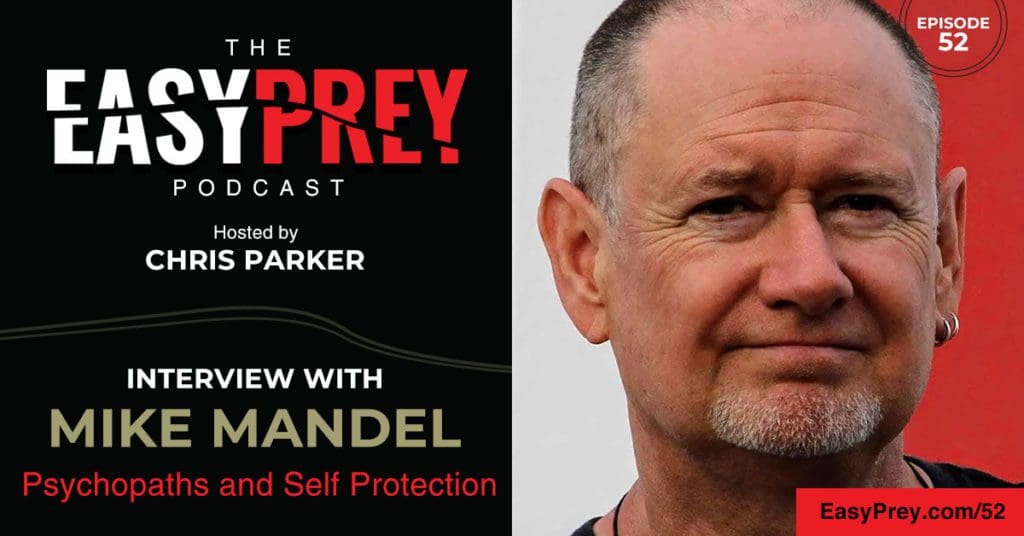
Most of us would not consider ourselves to be an easy target for a predator. But we may be communicating signs that we’re unaware of. Today’s guest is Mike Mandel.
Mike’s career has covered many different fields from stage performer, trainer, psychotherapist, martial arts instructor, writer, and corporate speaker. Mike is a renowned hypnotist with 18 nominations and 6 awards for excellence in entertainment and is also considered an expert in the unique martial art of British Jiu-Jitsu. He has trained both law enforcement and security personnel and boasts a diverse client list that includes Microsoft, Scotia Bank, and the Department of Defense. He has been featured on both British and Australian television, profiled in numerous publications including Martial Arts Illustrated, I Spy Magazine, and Toronto Star.
“I didn’t recognize the warning signs, because I didn’t know them.” - Mike Mandel Share on XShow Notes:

- [1:07] – Mike shares his background as a hypnotist and training in British Jiu Jitsu. He is a forensic hypnotist that works on murder cases and has spoken at colleges and universities.
- [2:03] – When he was younger, Mike admits that he was far too trusting. He went into business with a business partner who turned out to be a psychopath.
- [3:09] – Before the issues with his business partner were revealed, Mike had an experience on a plane with him getting suddenly angry about his handwriting. Now, as a graphologist, Mike knows now that his writing was a clue.
- [4:51] – After dealing with overwhelming stress, Mike reached out to a friend and former colleague who is a forensic psychiatrist who said that he was taken in by a highly functioning psychopath.
- [5:46] – This experience led Mike to study psychopathy and he now does lectures on the topic, specifically signs in handwriting.
- [6:30] – The terms psychopath and sociopath are used synonymously.
- [7:01] – Mike shares that there are many psychopaths who are immensely successful and some are in the armed forces. Generally speaking, they can rise to the top with ease because they don’t have the same fears as an average person.
- [7:52] – Mike describes psychopaths as grandiose and good at luring people into their presentation.
- [8:23] – There was a study done on psychopaths in the prison system where they were shown the same video of random people walking on the street and asked who they would target. They all chose the same person.
- [9:18] – Psychopaths are very good at hiding their true selves and are extremely patient in waiting for their opportunity.
- [10:27] – Psychopaths are so good at what they do. Mike shares that he has known detectives and psychiatrists who have been fooled.
- [11:30] – Mike doesn’t think that psychopathy can be “fixed” as their brains simply do not process things the same way.
- [13:02] – Almost every scam that Chris has heard of has some sort of emotional connection.
- [14:19] – We need close friends in our lives, but the scary thing for Mike was that the psychopath that tricked Mike was a close friend.
- [15:45] – The first tip Mike has is to be aware of your surroundings at all times. This awareness is also important in your online surroundings.
- [17:18] – Mike shares a story about what he calls his “spider sense.”
- [18:02] – Mike describes a color system he has that illustrates a way to condition yourself in being cautious and aware of your surroundings.
- [20:31] – The Witching Hour is a window of time between 11:00pm and 3:00am that your chances of being in a violent encounter are higher than other times of the day and night.
- [22:50] – We don’t want to be paranoid, because if our spider senses are set too high then real problems are indistinguishable from the background.
- [25:11] – Mike describes self defense versus self protection.
- [27:40] – While in public, Mike is always assessing situations and never putting himself into a position that someone could surprise him.
- [29:14] – You want to make it that it is an unconscious response.
- [30:07] – Mike describes the different proximities and how safety comes through distance.
- [32:17] – When asked about the prisoner study where psychopaths would pick the same people to target, Mike shares that one of the things they picked up on was an asymmetrical walk.
- [33:51] – Mike describes how our level of confidence is apparent in our body language and many people seem to have a target on them because of, what Mike calls, a “victim signal.”
- [34:45] – Avoid everything and every place if it doesn’t feel right.
- [35:52] – Chris and Mike make the connection between real-life and online targeting.
- [37:01] – They use the psychological trick of appealing to scarcity and urgency. We are all vulnerable to these things even if we know about them.
- [40:20] – Mike shares a story about an experience with his online business being harassed by a client.
- [41:12] – The way you disconnect from someone is to ignore and disconnect them. If you tell them over and over again that you’re not going to communicate, you are in fact communicating with them.
- [42:44] – Get toxic people out of your life. When you see signs of someone in your life that you feel are “off,” you need to be prepared to fire people out of your life.
- [43:47] – Mike explains how the traits in the writing of the psychopath that was in his life stood out to him and shares how specific features look.
- [45:08] – The “Felon’s Claw” is a trait of handwriting that indicates that someone feels guilty.
- [47:37] – Mike’s final piece of advice is that you can’t change a psychopath and you will likely come across one in your life. The revenge that we have as healthy, functional people is to not obsess over them.
Thanks for joining us on Easy Prey. Be sure to subscribe to our podcast on iTunes and leave a nice review.
Links and Resources:
- Podcast Web Page
- Facebook Page
- whatismyipaddress.com
- Easy Prey on Instagram
- Easy Prey on Twitter
- Easy Prey on LinkedIn
- Easy Prey on YouTube
- Easy Prey on Pinterest
- Mike Mandel Hypnosis Web Page
- Mike Mandel Hypnosis on Facebook
Transcript:
Mike: Yeah. I'm a hypnotist, a hypnosis trainer, and an NLP trainer, but I'm also a martial arts instructor. I teach a uniquely British Jiu-Jitsu system that is used by British Army. It's basically shutting somebody down in two seconds. We don't wear pajamas, we train everywhere, we wear street clothes and steel-toed boots, and carry edged weapons because that's what happens in the real world.
 Also, I'm a forensic hypnotist that worked on numerous cases—armed robberies, murder cases, and so on. Psychopathy is a really interesting mind, having been taken in by one. I did a lecture in the university and college circuit called Are You Dating a Psychopath? And we run Brain Software. My business partner, Chris Thompson, and I run Brain Software which is a podcast dedicated to hypnosis and helping personal development, all things brainy. So, here we go.
Also, I'm a forensic hypnotist that worked on numerous cases—armed robberies, murder cases, and so on. Psychopathy is a really interesting mind, having been taken in by one. I did a lecture in the university and college circuit called Are You Dating a Psychopath? And we run Brain Software. My business partner, Chris Thompson, and I run Brain Software which is a podcast dedicated to hypnosis and helping personal development, all things brainy. So, here we go.
Chris: That's awesome. That's an incredible background. You said that you were taken in by a psychopath. Can you tell me about this?
Mike: Yeah. I have this thing where—not so much now that I'm approaching 68, but when I was younger—I was much too trusting. I didn't know how to read warning signs. I'd not be buffeted by the world very much so I gave people a benefit of the doubt far too much.
I had a business and my business partner—without my knowledge—was working behind the scenes. He was running three streams of income, but I only knew about one of them. Eventually, this all came to light and amazingly, he began to rally people around him even though he was the one ripping me off.
Strangely, because he was so skilled as a psychopath, people believed him or they'd say things like, well, there are two sides to every story. I'm going, well, since he's the one who's sneaking around, lying, deceiving, and taking all the money, how can it be anything but that's what happened? I was baffled. I couldn't understand how this had all come into being.
The interesting thing is, Chris, I'm a forensic graphologist, too. I do scientific graphology. I’ve done it through different corporate clients, and I teach it. We have online training in it. Interestingly, we were traveling by plane and his laptop died. This is before these all came out. His laptop died and he started making notes by hand. I saw his handwriting and immediately saw some of the bizarre traits of unstable personality, multiple indicators of deceit with his writing.
I said, what's with your writing? He crunched the paper and said, there's nothing wrong with my writing, the problem is you. He just started yelling at me defensively. I just sat there on the plane. He suddenly realized he was shouting on the plane and laughed nervously. You know what happened? I was told—when I did my graphology training in the early 1990s—always trust the writing, the writing never lies. It's based on large samples, the same as any other form of psychology, large numbers.
What does the writing of alcoholics have in common, the writing of high-achievers, whatever… They said the writing never lies, but I let the writing be pushed aside by what I knew about this guy. I said, no, he can't be a problem. I've known him for years. He's my friend, there's no way the writing's correct. But a couple of months later, it all came out. The writing was correct, and I found out all the machinations that were going on behind the scenes.
I sat out one night in bed, and my wife said, what's the matter? I said I feel like I'm having a heart attack, the stress of this. I said I'm trying to figure out do I go to Toronto East General which is close or do I go to Toronto Sunnybrook which has smart Jewish cardiologists? I'm saying that as a Presbyterian. She said, you're not having a heart attack, you're under stress, you need to talk to somebody.
I contacted a friend of mine. I did training for the Ontario Provincial Police, their behavioral science unit. I found a colleague of mine and phoned him up. He's a forensic psychiatrist. He said, come and meet me for lunch. I told him the whole story. He said you'd been taken in by a highly-functioning psychopath.
I was freaked out in shock. He handed me a book by Robert Hare. Robert Hare is a world authority on psychopathy. He's out of Vancouver, Canada. I did a quest, started studying this, and realized what had happened to me. I didn't recognize the warning signs because I didn't know them.
We say 1 in 100, sometimes 1 in 50, people are psychopathic. They'll rise to the top of industry, they're big in churches, the judiciary, all sorts of systems where they're able to use their ruthlessness, lack of empathy, drive, and lack of fear to get very, very high up.
 That's what happened to me, so I began doing a college lecture, teaching university college students to recognize traits of psychopathy in people's handwriting. It's been a remarkable journey because it's not something I ever figured I'd be doing.
That's what happened to me, so I began doing a college lecture, teaching university college students to recognize traits of psychopathy in people's handwriting. It's been a remarkable journey because it's not something I ever figured I'd be doing.
Chris: I've heard that from other people who are in these types of fields. They ended up in it through circumstances and events that have happened in their own lives that point them in a general direction.
Before we get into some of these traits and ways, can you give me the clarity between psychopath and sociopath? Most of us aren't in mental health fields so we don't know what the differences are between those.
Mike: My source for this is a friend of mine, Peter Collins. Peter is a forensic psychiatrist. I asked him that same question and he said, we don't differentiate anymore. He said psychopath is just a term that's used across the board. It seems to be more in TV shows not as a big differentiation, but I just use psychopath as the terminology.
They vary in degree, some are very highly-functioning. Soldiers are psychopaths. Not all of them, but there are psychopaths in special forces. That enabled them to do almost impossible things because they don't have the fears that you and I have or typical people would have.
But then there are the others. Those who are sold up to the traits entirely. It's narcissism out of control as well. Narcissists some people say are garden variety psychopaths. It's all about self. Psychopathy, of course, takes it further.
I think we all see more and more of it. I don't know why, but my impression is that it appears to be becoming much more spread throughout the populace. I don't know if we're just able to detect them more easily now or we're seeing more of them. They're really, really good at preying on people.
Chris: Let's talk about some of these traits. You talk specifically about handwriting traits, but I assume there are also personality traits that we can see?
Psychopaths have a great expression of self. They’ll gesture in a very grandiose manner as they’re talking. -Mike Mandel Share on XMike: Yes. One of them is you'll see a grandiosity, the great expression of self. They'll gesture in a very grandiose manner as they're talking which is one of the ways that my business partner tricked me. You don't listen to the words, you begin to follow the presentation of the gesture. They can really lure us in.
Actually, if we stop and listen to the content and step back, human beings have—according to Human Givens theory—the ability to step back and disassociate from a situation and look at it from the outside. That's one of our greatest strengths. We will be triggered emotionally. They size us up very, very quickly.
 I remember watching a series of videos where psychopaths in the American prison system were shown videos of people walking down the street and asked who they would choose as prey. In crowds of people, they would uniformly choose the same person. They would be able to tell from their body language and their gestures that they were not presenting a sense of strength and confidence, but there was this uncertainty, this gullibility that was coming out even in the body languages.
I remember watching a series of videos where psychopaths in the American prison system were shown videos of people walking down the street and asked who they would choose as prey. In crowds of people, they would uniformly choose the same person. They would be able to tell from their body language and their gestures that they were not presenting a sense of strength and confidence, but there was this uncertainty, this gullibility that was coming out even in the body languages.
They're keenly observant of other people, really, really good at it. And because they are without fear to a large degree, they all take chances. They don't always learn from their mistakes, but they are very good at hiding within themselves. They don't give away the store. They'll wait a very long time.
My friend said to me that the person who took me in had waited years for this opportunity. They'll do that. They'll wait for the perfect moment to pounce and realize that if we're engaged emotionally with people, we do not see these tells.
Emotions, any strong emotion actually makes us stupider, according to Griffin and Tyrrell who were British psychologists, Human Givens theory. Again, any time we are really experiencing strong emotion, we are prone to black and white thinking and we miss things.
For example, the sixth month honeymoon in a new relationship. We tend to ignore the obvious bad stuff. We maximize the good stuff, we minimize the bad stuff. The joking line always says, yes, dad, I know he's a serial killer who just got out of prison, but he brought me some wonderful strawberries from the farmers' market. Emotion will cloud our judgment. A lot of it is learning to calibrate, being aware as human beings.
One of the cases I worked on was brought to me by a detective. Him and his wife were victimized by this psychopath. Even a detective, the psychopaths will fool psychiatrists to let them out of prison. They're so good at their stuff that to think we can outthink them and outfox them is the height of falling, really, so we just have to recognize that there's no emotion. There is zero empathy. Emotional typically, I'd get anger or frustration but not love, not real love.
They say when a psychopath goes to a funeral of a friend, he does not feel the pain of losing the friend. Instead, he will marvel at the facial expressions and gestures of the other people present. He makes a presentation as though he or she is feeling that emotion. It's a very interesting subject.
Chris: Not that I'm trying to empathize with the psychopath, but it almost sounds like that's a very exhausting way to live if you're trying to put up this front constantly.
Mike: It seemed that way, Chris, but I don't think it is for them. I think it is so naturally a part of their being. They process information differently, and words like love and things like that are not even processed the same way in their brain. It's just a remarkable thing. It is hardwired in, and I don't know that there's a psychiatrist in the world who can fix them. I don't think psychiatrists can fix psychopathy at all. It's just yet another way that nice people are victimized especially if we send signals of being victims.
I just got an email from a friend of ours who goes to our little church. He's in his early 80s. He told me that he had been given $100,000 by the United Nations. I’m like, what? He said, yeah, your name was on the list, too, you're eligible for it. I said, oh, okay, what is this? Oh, they give money to children and these building projects, but they also just give $100,000 to people who need it. I said, do you actually have the $100,000? First, he said yes and then he said, well, I don't have it but I'm getting it very soon. I said, what do you have to do to get it?

Scams can look very appealing.
Here's the scam. They were sending him a cashier's check for $100,000 U.S. and all he had to do was pay the $900 U.S. for the security company to deliver it and hand it to him. Of course, that would go on his credit card. It boggles the mind to me—as someone who's pretty security-minded—the things that people fall for.
Chris: I think even beyond psychopaths, almost every scam that I've talked to people about, there's always a very emotional element to it. That, we know you're going to do good with this money, we know you're such an outstanding human being, we know life has been tough for you, and we want to help you. It's like, oh, someone finally cares about me, or someone finally sees who I really am.
Mike: That's so true. That's one of the three keys in Greek rhetoric. People like Aristotle and so quantify these things. That's pathos. We're bringing in emotions. When we do an emotional, empathic appeal, the guard goes down to a large degree. That's one of the first things we should be aware of as people who are potential victims but don't have to be is to recognize when the emotions are becoming engaged, our intelligence starts to drop through the floor. We are not as smart when we're experiencing any emotion. That's really key to one of the things, to be able to step back and say, hang on, let me think about this in a more objective fashion.
Chris: Do you think that's where the value of having those close personal allies in your life can be more objective that you're telling people about? That you're just talking to your life about, hey, I ran across this business opportunity, what do you think?
Mike: Yeah. You're banging on the dot. It's key to have some close personal friends, and they will be the ones who will tell us the truth regardless of what we think. The level below that is people who will appease us. They're our friends, but they're more acquaintances. Real friends will do the hard stuff. They'll whip our appendix out when it's needed instead of telling us we need an aspirin.
We need people like that in our lives. But the scary thing is this guy was one of those people in my life. That's how clever they are at warming their way in and building those kinds of bridges. I don't think we should go paranoid at, oh, everybody's out to get me. But we need to recognize that there are a lot of predators out there.
My wife was on a subway in Toronto. She's got a very strong spider-sense. She just turned around and on this crowded subway, there's a guy 40 feet away just staring at her, locked on her, and not blinking.
She exited the subway and she was aware he was following her. She crossed over Yonge Street which is the biggest street in Toronto. It's huge and goes right up to James Bay. She crossed over and he crossed over behind her. She went into a store where she could phone. Eventually, he had disappeared, but she picked up on the fact that he was tracking her.
I'm amazed at how oblivious most people are to things like this. Step one, be aware of your surroundings all the time. My friend, Allan Bell who’s an expert in the special forces—he protected the royal family, he's 12 years in the SAS, and 7 years in the Royal Marines—said, for women, he can't believe they even park in underground parking lots alone. It should be the last thing you do, and if you do, walk right in the middle, away from all the cars where you can see if someone's approaching you. If someone tries to rape you, roll underneath the car, hold onto the undercarriage, and scream your head off. Scream words, help, help, I'm being felt.
Don't just scream, people take it as a joke. No woman in history has been raped underneath a car. There are things we can do, but the number one thing is going to be aware. Awareness online, which is a thing you know all about, awareness when you're in public, awareness when you're in your home. Recognize that some people want to take advantage and some people are extremely violent and will go to any lengths to do that.
Chris: What things should we be looking for in that awareness? How would we define something that's out of the norm of what we would expect?
Mike: Gavin de Becker, who's one of the world's famous authorities on security, talks about The Gift of Fear. It's actually an excellent book. He says so many people have essentially damped down their intuition. They've damped down that God-given gift of, something isn't right here. I call it spider-sense. I've got a really strong one because I've developed it over the years especially as a martial artist.
An example is a small town called Greely, which is near Ottawa, the capital of Canada. My friend had a house there years and years ago. I have a presentation at the University of Ottawa. I was arriving at his place around 11:00 PM. He said, I'll leave the door unlocked. I walked in the living room—there's just a night light on—I walked halfway across the room and my spider-sense triggered. I don't know why. I looked behind the couch and he was lying down behind the couch. He was going to jump up and scare me. He said, it's impossible, how could you know I was there? I said, I listened, I listened to these cues. One of the things we could do is recognize those fewer things are for our safety. They're to let us know something isn't right. We've got to learn not to avoid these signals.

State of awareness color codes
I talk about going through life with three color codes. Most of the time, we're in green. Green means everything is copacetic, everything is okay, we're safe. As soon as we go to a new place, a new city, we should automatically mentally shift to yellow. Just meaning there are going to be some unknowns here I'm not completely aware of. Then, if things start to get a bit off, let's say we got to walk past a big, deserted area at night Downtown, now, we should be going to orange. Orange means I'm on full alert. Red means there's something wrong, we should never go there.
You should always look to bringing things back to green as soon as you can where there's no threat. It's okay to go through yellow temporarily if you can't get to green, but you should not be staying in orange because orange leads to red. That's all a matter of simply conditioning yourself.
Ask questions. You're in a mall, somebody's sitting by himself, and he looks odd. You ask yourself, why does he look odd? What is it I'm noticing here? What isn't making sense? Oh, yeah, the guy was dressed like a street person but he's wearing a Rolex watch.
This has triggered unconscious associations. The first thing is to be aware and to be aware behind the wheel of a car as well. I was at a traffic light turning into a large mall in Toronto just coming up to sundown. The car behind me honked at me because he thought I should've gone and I didn't. There was another car approaching, he didn't notice. I just ignored him and I pulled into the mall.
A minute later, I saw the same car again in my rearview mirror and it set off a signal. He came roaring up behind me and the door opened. He jumped out of his car. I don't know what it was but I jumped out of my car right away. I had a tactical baton in the door. I jumped out, snapped this thing open, and said let's go. He just went back and the car was gone. I don't know what his problem was but I was aware that he was there.
He could've gotten to my car as I was opening the door when I didn't notice. It's look, leave, or lean. You have to be checking before you get out, not getting out of the car and then looking around.
Even my own wife made a mistake and she's got a strong spider-sense. In a parking lot, she opened the door, and there was a guy there. He got between the door and her before she could close the door again. He just wanted some small change, but it could've been a lot worse. My friend, Allan Bell the soldier, said if something goes wrong if there's a situation, it's because you screwed up. That's the first thing.
One of the things that your listeners would be wise to adopt is something I teach my martial arts students, called the witching hour. This one thing can protect you from all kinds of potentially violent confrontations and horrible things. After 11:00 PM in western society, your chance of being in a violent encounter starts to climb rapidly. It peaks probably around 1:00–2:00 in the morning. Then after 3:00 AM, it drops rapidly again. There's a window there where your chance of being in a violent encounter is way, way higher, and it starts about 11:00 PM.
We call it the witching hour and we say, wherever you got to be, get there by 11:00 PM. If you're not out and about at that time, if you're not walking around and going places you shouldn't be after 11:00 PM, you're not likely to get into a problem.  If you do have to go out at that time, you got an event or something, make sure people know where you are, make sure you got your cellphone with you, make sure your car doors are locked, make sure you got a clear route home, and if possible, be with other people. It's when we break the rules that we set ourselves up for problems.
If you do have to go out at that time, you got an event or something, make sure people know where you are, make sure you got your cellphone with you, make sure your car doors are locked, make sure you got a clear route home, and if possible, be with other people. It's when we break the rules that we set ourselves up for problems.
Chris: My wife and I always joke with our friends that nothing good happens after midnight. By midnight, you want to be home in bed, hunkered down, and you're done well before midnight because nothing good happens after midnight.
Mike: Yeah. You're right on with that, Chris. Nothing good happens after midnight outside the house, anyway. I got a friend who's a Louisiana deputy sheriff. He says before bed every night—he's an extreme case—he gets his Glock, goes through his entire house, every room, every spot that a human being could be hiding before he'll go to sleep. That's an extreme case, most of us will never have to live like that. But in his industry, he's made enemies over the years and he has to be careful as a result of it.
We don't want to be paranoid because if our spider-sense is set too high, then real problems are indistinguishable from the background. That's bad as well. Sometimes, you go through an airport, or we used to before COVID. If they have the sensitivity set too high on metal detectors, you'll notice they're checking everybody because everybody's setting it off. The fillings of their teeth are setting it off, their wedding rings are setting it off.
That is pointless even if we have the thing because if you're going to do a body check on everybody and pat them down, why even have the device? That's what happens if our sensitivity, if our spider-sense is set too high. Everything becomes a problem. That's useless. We have to have it set high enough that we notice anomalies standing out from the background radiation. That's what enables us to take the steps to be safe.
I was in Las Vegas for Hypnothoughts Live which is the biggest hypnosis conference of the world. I present there quite regularly. I was in the elevator of The Orleans Hotel going up at night. I'd just done a presentation and I was wearing a sports jacket and jeans, but I routinely wear steel-toed boots because I got a weapon with me all the time. That way, it ups my defensive capability. The door of the elevator opened and 2 guys in their 20s with a girl in her 20s all got in together. They wanted to show off to her. My buddy is in the elevator with me. As they got in, he got out and they kept going up.
Two floors we passed no sound, and then they looked at each other. One of them looked at me and he said, oh, you're in trouble now, you're trapped with us, and he grinned at me. I said, it depends on how you define trouble, these are steel-toed boots. They just both shut up and looked away right away.
It was the congruence. I said it with eye contact and intention, and he knew this would be a mistake. They were just kidding around, but that comes on the ability to size up a situation, know when it's safe to not go somewhere at all, when it's safest to disengage, and when it's safest to fight for your life.
I tell women all the time if someone attempts to abduct you, you never go with them. Fight to the death right away at that instant because if you are taken to a secondary crime scene, your chance of survival is almost non-existent. You must fight immediately with everything you got. I don't mean try to throw him or try to punch him. I mean freaking blind him, tear his testicles off, bite his throat. You have to go ape shit if you're going to win this.
Chris: Do whatever you can right away.
Mike: Yeah, you won't get a second chance. That's why self-defense is nonsense at all because if you're defending, you've already let the person make the first move. That's the street fighter's advantage. He knows it's on before you do, so if you're defending, you're always a move behind him. We have to recognize and stay out of his range. The way you win a confrontation is to attack not defend. Once you know it's on, attack with surprise, aggression, and speed. Make sure he can't follow you.
Chris: I suspect when you have a mugger or someone who's attacking you, that it's probably not their expected results from you if you turn around and attack aggressively.
Mike: That's exactly right. We want to turn the other person into prey. We can hardwire that in by having a few, very simple moves. Complex martial arts will not work in the street. They will not work because they depend on fine motor skills and complex motor skills that when we have adrenaline overload, we're simply not going to be able to do them.
You cannot put a key in a lock to open your car door when you have a huge adrenaline dump in your system, your hand will shake too much. You have to depend on gross motor skills, kicking, edge of the hand strike, fingers in the eyes, things that you can do no matter how much adrenaline you have. You don't hit the guy and step back to see what happens, you press the attack, put him on his heels, you on your toes driving him forward. When it's done, you make sure he's not going to follow you.
It's brutally effective. We recommend something called beer canning the person. If someone is trying to injure you or kill you, you don't know, you don't wait and say, oh, I don't think he's trying to kill me, I just thought he was being a jerk. If he's going to attack you, beer canning is something we've all done.
You put a beer can on the ground. Or pop can, soda pop. Stomp it with your foot and flatten it. That's what you got to do. Once the person is taken out, we recommend you to beer can their knee or their ankle. You cause an injury, so they cannot follow you. You don't have to kill a person but statistically, if you can increase the distance between you and another person to 20 feet, they usually won't follow you.
Chris: You're too far away, it becomes too noticeable.
Mike: Yeah. Too obvious, too noticeable. But again, if you have any kind of confrontation, it means you screwed up. You screwed up somewhere, missed some kind of signal. That's the main thing, tuning our awareness and recognition.
When I used to teach in Downtown Toronto, I took the subway. It's my wife who'd have our car; we're a one-car family. I'd see someone get on and I'm always evaluating. I don't sit with my back where somebody can choke me, I got my back against the wall. Not that I'm paranoid but I'm prepared. I'm automatically seeing someone come in, that guy looks like he's stoned, I'm watching. Is it crack? Is he violent? I'm just calibrating who's coming in and who's going out. It's largely unconscious now.
I'll ask my students. I'll say okay, we'll be on a subway or we're walking Downtown, if that guy there went nuts, how would you take him out, what would you do?

Be aware of your surroundings when getting into your car.
He's got a heavy coat on. You can't hit his body, it's not going to work. You're going to have to do something to save your own life. A big part of this is just the obvious—being physically fit because if something goes past 30 seconds in the street, you'll get exhausted very, very quickly. Again, best to avoid.
Chris: I'm going to ask you two questions that are winding back a little bit. We talked about being aware of your surroundings, trusting your gut in situations, and calibrating that to the right level. Not where a bird flies by and you're getting out of your baton, or the guy runs by with a shotgun and you don't even notice. Where should we be thinking that level should be? If I go to an outdoor mall, how often should I be listening to my gut? Should it be every fifth person, every tenth person, every hundredth person, once a day?
Mike: There's an easy way to set it up, Chris, and it's simply this. You want to make it so it becomes an unconscious response. When it's unconscious, that's when you get spider-sense.
Something will catch your attention. The way to get there is I tell people to work with Edward T Hall's Proxemics. Safety is created by distance. With everything, from knives to atomic bombs, the more distance you have, the safer you are. In order for someone to use a knife or an impact weapon, they have to be very close. We start to think of things in terms of range. There's a social range outdoors where people are outside our kicking range. They're outside where we couldn't reach each other. Maybe eight feet away. People pass each other on the street, they don't get too close.
Then, we have a range that is more a colloquial range with friends and people we know, or people we just met at a party or something. They're not really close. They're standing a few feet away. That is the kind of range that feels safer. We know people.
Then, we're going to get in an intimate range which we are sometimes forced into by things like elevators. Also, people who know each other well will stand closer. Maybe three feet away.
Only are we in physical contact when we're very comfortable with someone. The first thing to be aware of is when people begin to enter our closer range. That should be the initial alarm that gets our attention or someone who is rapidly approaching us from any direction.
The way to do that is we have to make scans. Scans become natural. You shouldn't be wearing earphones when you're walking on the street listening to music. You've shut down a channel that can be warning you about someone approaching, or a siren going up, whatever it is.
We open our channels of awareness and we recognize anything that stands up from the background as unusual. As it begins to move in closer to us, our awareness heightens. We think of it in terms of range. Things that are far away aren't that important. They can be evaluated. We can determine if we're going to take a turn somewhere else.
But again, we're going to be moving through areas that are going to give us green lights or at worse, yellow lights. We're not going to move into orange lights and red lights. That could be potentially horrendous.
I'd rather walk 10 minutes out of my way than go across a vacant parking lot at night in a rough area of a city. It's just stupid. There's no need to do that. Being aware of the distance is, at first, we'll start to set up our spider-sense.
Chris: Okay. We have gotten really far off of psychopathy, but all these are still immensely interesting. Let me roll back to one of the questions that I had. You were talking about interviewing people or talking with prisoners and having them identify who they would target out of the crowd. They are very consistently picking out the same people. What were those individuals that were being picked out doing or not doing?
Mike: The one thing that was named was an asymmetrical walk, which is very, very interesting. What that actually means is when I walk down the street, I've trained myself to walk like I own the freaking street because people who are psychopaths, people who are predators, are looking for easy prey. They don't want to have to fight to get your wallet. They want to intimidate or do something quickly with someone who is going to be weak and easy to dominate.
When I walk, I swing my arms, I look from side to side. I'm sending a message that I'm strong, that I'm congruent, or at least I'm going to be a problem if you mess with me. These people in the video—all women—were walking in an asymmetrical way. Walking, looking to the side, not paying attention to what's in front. Maybe, one arm could be up like this. It gave a signal of lack of congruence, some kind of uncertainty, or only a vague awareness of surroundings. That sends a very strong prey signal.
My wife was walking up the road like I actually see from my window here right by the high school. They were just high school kids. There were 3 kids out there, 16–17 years old throwing snowballs at signs, at cars as they passed.
She was coming at the other side of the road. They looked over to her and they said something. She just walked like she owned the street and stared right at them. Not one of them threw anything at her. I figured she's sending a signal, I'm not a victim, you mess with me at your peril. The people in the video were not sending that. They were sending a victim signal. It's almost like some people almost have a target on them saying, take advantage of me.
Chris: Situations happen. If you know that crime has happened in this park, I should just avoid that park?
Mike: Yeah. Avoid everything that doesn't look right and doesn't feel right. We don't have the same number of guns in Canada as you're going to get in the US. They tend to be quite rare, but people are still mugged, people are still hurt, and people are still taken advantage of. I mentioned before about the guy who was thinking he was getting $100,000 from the United Nations. It is so obviously ridiculous. I can't understand how that wouldn't even occur to him.
Again, our number one weapon is avoidance and awareness. If we're aware, then we're going to detect threats before they become really serious. If we're aware of our surroundings, then we don't have to go into situations that will be threatening in the first place, if that makes sense.
Our #1 weapon is avoidance and awareness. If we’re aware, we’re going to detect threats before they become really serious. -Mike Mandel Share on XChris: Yeah. Anytime anything is something out of the ordinary, that should be a particularly big red flag to us. Something is going on.
Mike: That’s right, but let me ask you, Chris, because this is more your area of expertise than mine. How would this sort of thing apply online?
Chris: Like what you've talked about in terms of your friend who got an email or some suspicious contact says, hey, we have this large amount of money for you. Our first thought needs to be how would the United Nations even know about me, and why would they want to give me a large amount of money? Then, why would it cost me money to get the money? It's not like when I get a paycheck, my bank says, hey, in order to get your paycheck, you need to give us $900.
Yeah, there are transaction fees on some things in our lives, but there are almost never transaction fees. I think the reason why those transaction fees work is because someone is seeing dollar signs. The greed, the emotion has kicked in, and they're now starting to look at that. Well, I can afford to give up $900 in order to get $9000, $90,000, or $900,000. It's easy math. Those are the things you got to watch out for. Even what you're talking before, someone's hey, here's this really great thing or this really bad thing. There's the urgency of, if you don't do something right now, either something worse is going to happen to you or you're going to miss out on this opportunity.
Mike: The psychological trick which is to appeal to scarcity, and everybody uses it. We use it in our online training and that. Act now and you save this money, and the implication is if you don't do well… Which is true. But we're all vulnerable to these things even if we know about them. That's what's so bizarre about it. You put a timer on an offer online and see the timer going down. I know what they're doing and it will still affect me.
Chris: That's the funny thing. Someone was talking to me. I was telling about these common traits that you see in scams and these things that are almost always consistent. He goes, that's also now felt like marketing to me.
Mike: Isn't that the truth? I saw the strangest example of this. This sounds like a joke, but my specialty is hypnosis, influence, and these things. My wife and I were in a bank in Downtown Toronto, I won't say which one it was. There was a poster in the lobby of this enormous bank. It was a poster for one of their products and they're endeavoring to get people to sign up for some kind of loan or whatever. But this was the exact wording, Chris. I have it exact because I couldn't believe it. It said this: “Borrow to get ahead so you don't fall behind.” What? Isn't borrowing going further in debt? This is going further in debt, falling further behind by anyone's estimation. They know it works.
Chris: What was Dave Ramsey's expression? You cannot borrow your way out of debt.
Mike: Oh, I've never heard that.
Chris: Something along those lines because everybody's telling, well, if you just borrow more money, you can solve your debt problems. It's like no, you need to borrow less money because that's what got you into the problem to begin with.
Mike: Right. One of the things that you said that really ran home with me was when you said about the offer. Why would the UN even know about me, why would the UN be giving me money—all of these questions. Scams are the online equivalent of someone at the door of your house, isn't it? You want to stop them at the door. Share on X
We have a saying in martial arts and security. It's a tautology, it's like saying it is what it is which gives no information, but it makes sense anyway if you know what I mean. We say you don't let them in because once they're in, they're in. We want to keep people out of our houses, they shouldn't be here. We want to keep them out of our lives, out of our bank accounts, and we want to keep them off our computers, too.
Chris: My wife is one of those people that I don't care who's at the door, if I don't know them and I'm not expecting them, I'm not going to open the door. I'm not even going to go to the door and say who's there?
I'll look at the camera, see who it is, and just utterly ignore them if they're not supposed to be there. You don't have to worry about the criminal in your house if you don't let them in your house.
Mike: Yes, exactly. About five years ago, our online business got an email from a guy. He was in France. He wanted to study with us. He was clearly a bit nuts. It didn't work out, and he kept writing and writing. We finally said, look, we can't help you. He said I want you to teach me hypnosis so I can find the Brazilian girl I met in the bar years ago who's the girl of my dreams. I said, hypnosis doesn't work like that, I can't help you. We told him a billion times, so we started blocking his emails. He started writing through a different email again so we blocked that.
Then, he started phoning—through some Internet protocol—my business phone in Toronto. It got so bad, I got Bell Canada involved, I got Toronto Police Service involved. We had to cancel my business line that I'd had for 30 odd years.
Then, he somehow got our home number and he started phoning me at 3:00 AM Toronto time and saying, I want you to teach me hypnosis so I can find the girl of my dreams. It was a freaking nightmare.
The way you disconnect from someone is you tell them once and never tell them again. -Mike Mandel Share on XEventually, because I just kept hanging up. Here's one of the keys. The way you disconnect from someone who's a problem is by disconnecting. It sounds stupid, but you don't say to them, look, I've told you a dozen times, stop calling me. You tell them once, then you never tell them again. You never have contact with them again, you never answer their questions, you don't answer their emails. When someone's a problem, you tell them just once that you're disconnecting and never tell them again, because every time you say look, I've told you before, you've just hit the reset button again. That's the key. Tell them once and never talk to them.
One of my business partners, the one who ripped me off, sent me a big package of mail with no explanation. I just said, get out of my life. I said, Jesus, get this out of my life, throw it in the garbage. My wife said we're not even opening it? I said no, I don't know what it is, I'm not even opening it. I told him I have no contact with him and that means I won't even know that something he sent me. That was it.
Chris: I think those are the things you have to stand your ground once you decide I'm not going to engage with this scammer or this person I don't trust and stick to it.
Mike: It could be difficult. It could be hard especially when it's someone who's had an influence in our lives. The foot-in-the-door for a long time. It can feel like we're losing something, but we can lose a lot more than, I suppose, a friendship. And in any case, who wants to be friends with someone who's manipulative and freaking evil?
One of the most empowering things we can do, Chris, is to periodically fire people from our lives. I say that as a therapist. Get toxic people out of your life. We give them a chance, we talk to them, we give them another chance, and if they're proven to be toxic, you just get rid of them.
One of the most empowering things we can do is to periodically fire people from our lives. Get toxic people out of your life. -Mike Mandel Share on XI've got a stepbrother who's a low-level criminal, he cannot be trusted, and he has nothing to do with my life. I won't let him in. Life is too short. My mom died at 53, my dad at 57, I'm coming up to 68. I'm past the expiry date of my family, and I get to enjoy my life. I'm not going to let lunatics, idiots, and psychos in.
We have to be prepared to fire people who are basement people, who drag us down and support people who are balcony people, those who lift us up. They're the ones we need to spend time with.
Chris: Those are great words. I wanted to come back because I feel like we didn't finish the story about your business partner. Maybe this is a little hard to do in an audio format, what about his writing made you realize oh, my goodness, this is a problem?
Mike: I can tell you and I can explain it well enough that you should be able to pick up on this. One of the traits he had in his handwriting is one of the worst traits you can have. It's called the Felon's Claw. It's actually found—according to Andrea McNichol—in the handwriting of 80% or more of people in the American penitentiary system.
I don't know if this appears in the handwriting as the personality changes or how it happens, but it is definitely there. When we make a letter, I'm going to actually draw it for you because you will get me on video here, so you'll understand what I mean.
Chris: For the audience, I will screen capture this and show it to you in the show notes.
Mike: Here's a letter G, it could be a G, a Y, any letter that has a descending loop that goes down into the unconscious.
Here's one with a Felon's Claw. You see this point here, it must have a point and gash back like this. That's the trait, and it's a trait of manipulation. Some people who do graphology—I don't know if this is correct enough, but it makes sense—see that as someone who has a lot of guilt and does crazy things so that they'll be punished, which is interesting as the reason behind it.
I don't know but many, many years ago, I had a signed copy of Robert K. Ressler's book, Whoever Fights Monsters. He was the man who invented the term serial killer. He was the consultant for Silence of the Lambs. John Wayne Gacy, the clown killer in the US, had drawn a picture or made a painting of himself in his clown suit that he would wear when he killed these young boys. He'd given it to Robert K. Ressler. I knew it was signed.
Before seeing the picture, I predicted. I said it'll have the Felon's Claw on his name. John Wayne Gacy had a Felon's Claw in the Y of Wayne, and he had a Felon's Claw in the Y of Gacy, big, huge ones. It was just intrinsic to his personality.

Felons Claw image is on the right.
That was the thing that my business partner had in his writing. And he had an unstable slant, some letters slanted forward, some letters slanted back. When you see that a lot, especially in the same word, that's someone who is switching back and forth between different ego states that are becoming executive, almost like sub-personalities but not multiple personality disorder. We all have different ego states.
Chris: Days that we feel one way versus another way?
Mike: Yeah. We all have a 50–150 sub-personalities and they're digital. They're neuropathways burned into our brain, but only one of them could be executive at any given moment. The ego state I have when I'm playing with my Egyptian Mau cat is not the ego state I want executive when I'm teaching Jiu Jitsu because it would be the wrong one for the job.
The key is people have multiple ego stages showing up in the same sample of writing, switching back and forth, a real sign of emotional instability. Rapists very often have very strong backhanded writing. Embezzlers have numbers that are weird. I think bombers have really tiny writing.
Chris: Uh-oh, I'm in trouble.
Mike: But tiny writing is also a sign of concentration. You need concentration if you're going to build bombs, I've heard.
Chris: Yeah. I would imagine that it is a detailed experience that you do not want to make mistakes when doing.
Mike: That's right.
Chris: Otherwise, you'll eliminate yourself from the skillset. Is there any parting advice you have for the audience today? Whether it's psychopathy, just how you behave when you're out in public, or how you interact with people. What's one final bit of wisdom you can impart for us?
Mike: It's a real simple thing, Chris, but it's a good one if you take it to heart. You can't cure a psychopath, you can't change them. You will run across them eventually at some point in your life. Hope that they don't do much damage in your life.
But the revenge that we have as healthy, functional people is to not obsess about them, to have a good life despite them. That's what I did. I didn't let the business partner and the loss of all the money and everything get to me. I decided to follow the advice and have a good life despite him. That's the best thing we can do, don't let them wreck your life.
Chris: That's awesome. Mike, thank you so much for coming on the podcast today.
Mike: Absolute pleasure, my friend.
Chris: Thank you for listening to this episode of the Easy Prey podcast. If you found this episode helpful, please take a few moments and write a review by visiting easyprey.com/review. Notes and the transcript of this episode with Mike Mandel can be found at easyprey.com/52.


Thanks, interesting stuff. Can you add the screen shot of the felons claw?